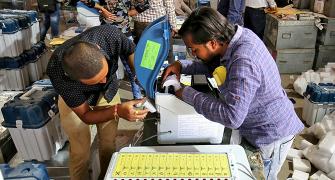The finance ministry's banking division seems to have mastered the art of putting its foot in its mouth. First, the confusion over the government's plan to buy back public sector bank equity wreaked havoc on the bourses. It should have learnt its lessons back in May-June last year but unfortunately....
The second and more recent instance that turned the markets volatile was the government's decision to increase the foreign direct investment cap in private banks from 49 to 74 per cent.
The intent, aired by Finance Minister Jaswant Singh in his maiden Budget last February, fructified with just a few weeks remaining for his next Budget. And it's still not clear how the government will allow 100 per cent subsidiaries of foreign banks and simultaneously limit FDI in private banks at 74 per cent.
The confusion in both cases was eminently avoidable. In the first instance, the issue went out of control after a reported tele-conference by a junior-level officer in the banking division with market-men.
The government has, till now, been buying back the recapitalisation bonds from public sector banks at face value. Stock markets dealt the banks a severe drubbing following indications that the government might actually buy back the equity at a premium and not at face value.
A finance ministry spokesperson denied such a move and said that the government would buy back the equity only at par. This sent bank scrips soaring again. The spokesperson obviously said so after taking the considered opinion of senior banking division officials.
A few days later, then finance secretary S Narayan said in a press statement that it was not the government's intention to accept equity returned by some listed public sector banks at par when the price was higher in the market. In a carefully-worded statement, he clarified that it had yet to decide if the buy-back would be at par.
Such flip-flops did the market no good with the prices of listed public sector bank scrips yo-yoing continuously. This prompted Singh to order a probe under then additional secretary in the department of economic affairs, B P Mishra, to check the role of ministry officials in the events leading to such volatility. Nothing has been heard since then. "Not all reports need to be completed," an official pointed out.
Meanwhile, the banking division had proposed three options to the finance secretary: redemption of the recapitalisation bonds at par, the price at which the bank issued initial public offers, or the historical cost of equity to the government (face value plus interest paid by the government less the dividend received).
But Singh had something else in mind. He sought the Reserve Bank of India's opinion, which said that the banks actually needed to further beef up their capital adequacy to meet the proposed Basel-II norms. As a result, the finance ministry dumped the buy-back plan.
The recent Cabinet decision to increase FDI in banks to 74 per cent is not only ambiguous, but also retrograde in nature.
Hitherto, private banks were allowed 49 per cent FDI and an additional 49 per cent through the foreign institutional investment route. The total foreign investment ceiling thus stood at 98 per cent. And through a special resolution by the board, private banks could have 100 per cent foreign investment.
The government has allowed 74 per cent FDI and capped FII holdings at 49 per cent within the overall foreign investment ceiling of 74 per cent. Simultaneously, it has also let foreign banks set up wholly-owned subsidiaries and restricted their branches here from acquiring more than 74 per cent stake!
Why can't this get simpler? If the ministry wants to check FII holdings, a 49 per cent cap is fine. But why allow both 74 per cent and 100 per cent equity holding in private banks through two different routes? And why penalise foreign banks with Indian branches by restricting their stake at 74 per cent and reward their competitors with no presence hitherto to float 100 per cent subsidiaries?
Officials say a clarification is due soon, but with a little thought, it could have been avoided altogether.






